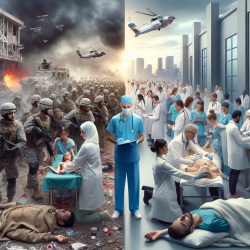The role of healthcare providers is critical in both war and peace. The research article "The Solidarity and Health Neutrality of Physicians in War & Peace" offers profound insights into the responsibilities and protections afforded to medical practitioners under International Humanitarian Law (IHL). This blog post explores how practitioners can enhance their skills by understanding these principles and encourages further research into this vital area.
The Importance of Health Neutrality
Health neutrality is a cornerstone of medical ethics, especially in conflict zones. It ensures that healthcare providers can offer care without discrimination based on nationality, race, religion, or political beliefs. The Geneva Conventions and their Additional Protocols explicitly protect medical personnel, facilities, and transports from attacks.
Practitioners must be aware of their rights under IHL to maintain neutrality and provide care impartially. This awareness not only protects them legally but also ethically aligns with the universal principles of medicine.
Solidarity Among Healthcare Providers
The concept of solidarity among physicians emphasizes a global commitment to uphold ethical standards and support colleagues worldwide. As highlighted by Sir William Osler's assertion that medicine is a worldwide profession, this solidarity is crucial in times of conflict.
Practitioners can enhance their skills by engaging with international associations and collaborative efforts that promote health neutrality. These platforms offer opportunities for education, training, and sharing best practices in humanitarian assistance.
Implementing Research Outcomes
- Education and Training: Engage in programs that focus on humanitarian assistance and the unique roles under IHL. This training prepares practitioners for the complexities of providing care in conflict zones.
- Advocacy: Advocate for the protection of healthcare workers and facilities. Practitioners should remind authorities of their obligations under IHL to safeguard medical personnel.
- Reporting Violations: Healthcare providers must report any violations of IHL or unethical practices to appropriate authorities. This action helps uphold the integrity of the medical profession.
- Networking: Build connections with international bodies that support health neutrality. Networking provides access to resources and support systems essential for practitioners working in challenging environments.
The Role of Practitioners in Conflict Zones
Practitioners working in conflict zones face unprecedented challenges. The research highlights alarming statistics from Syria, where healthcare facilities have been targeted multiple times. In such environments, practitioners must remain vigilant about maintaining neutrality while providing care.
The establishment of healthcare safe zones is crucial to protect medical facilities and ensure the uninterrupted delivery of care. Practitioners can play a pivotal role by advocating for these zones and supporting initiatives that promote safe passage for medical supplies and personnel.
Encouraging Further Research
The field of health neutrality is dynamic, with ongoing developments in international law and medical ethics. Practitioners are encouraged to delve deeper into this research area to stay informed about new policies and practices that impact their work.
Engaging with academic publications, attending conferences, and participating in webinars are excellent ways for practitioners to enhance their knowledge and skills continuously.
To read the original research paper, please follow this link: The Solidarity and Health Neutrality of Physicians in War & Peace.










